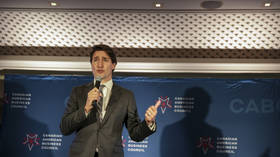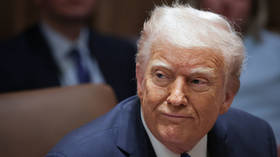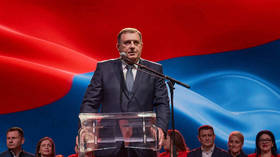What Canada truckers’ ‘Freedom Convoy’ is all about
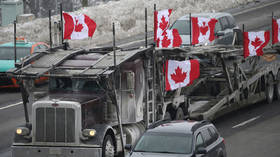
After a week-long drive from British Columbia province, a group of Canadian long-haul truck drivers – dubbed the ‘Freedom Convoy’ – made its way across the country to Ottawa, the national capital in the eastern province of Ontario on Saturday. The big rigs now dominate the national capital, casting a long shadow over political discourse both in the country and beyond. Thousands of truckers, and supporters, continue to protest against the federal government’s vaccine mandates and other Covid-19 policies – under the glare of law enforcement officials and the national media spotlight. Here’s what we know so far.
1. So, what kicked off the ‘Freedom Convoy’ exactly?
Until mid-January, cross-border truck drivers in Canada were exempt from vaccine requirements – meaning they could drive to the US and back without needing to prove vaccination status. After the government instituted a mandate that imposed a quarantine on unvaccinated drivers, a band of truckers in western Canada organized a cross-country drive to protest in Ottawa.
The movement gathered momentum and public support as it traveled east. It also garnered the backing of those who are opposed to Prime Minister Justin Trudeau’s Liberal government and that of anti-vaccine mandate groups frustrated with pandemic restrictions that they view as “political overreach.” According to a statement by organizers, the convoy demands that federal and provincial governments shut down vaccine passports and all other “obligatory vaccine contact-tracing programs,” and “terminate Covid-19 vaccine mandates.”
2. Are there really thousands of trucks on the road?
In its statement on Wednesday, the organizers said that “although our initial convoy [was] estimated to be 1,600 trucks, that number significantly increased to 36,000 trucks in just a few days. It is now estimated that the number of heavy trucks heading to Ottawa is closer to 50,000.” However, national media outlets and law enforcement bodies have reported anywhere from “hundreds” of trucks to figures in the low thousands over the past week. Some calculations have also accounted for cars and SUVs that have also apparently latched onto the convoy. The real figure likely lies somewhere in between – with the Canadian Trucking Alliance having estimated that the vaccine mandate would affect some 16,000 drivers since it claimed that between 85-90% of the country’s 120,000 cross-border truckers have been jabbed.
3. Do the truckers have popular support?
Over the past week, videos on social media platforms and news footage have shown trucks and other vehicles chugging along highways and city streets, cheered on by crowds of people gathered on the roadsides and overpasses. Large groups of people have also been waving Canadian flags and holding up signs that take aim at both Trudeau and his policies. The organizers have claimed to “have the support of millions of Canadians from across the country.” While authorities have not released figures about the number of people who arrived in Ottawa, local police sources told media outlets that the crowds in the capital’s Downtown area and Parliament Hill were similar to those seen during large gatherings on major public holidays – typically running into the tens of thousands. Reports in Canadian media have also highlighted crowds gathering for local rallies being held at various places in support of the Freedom Convoy. Another metric that hinted at the movement’s wider popularity is a GoFundMe campaign that has seen Can$ 8.6 million (US$ 6.7 million) raised from over 108,000 people over the past week.
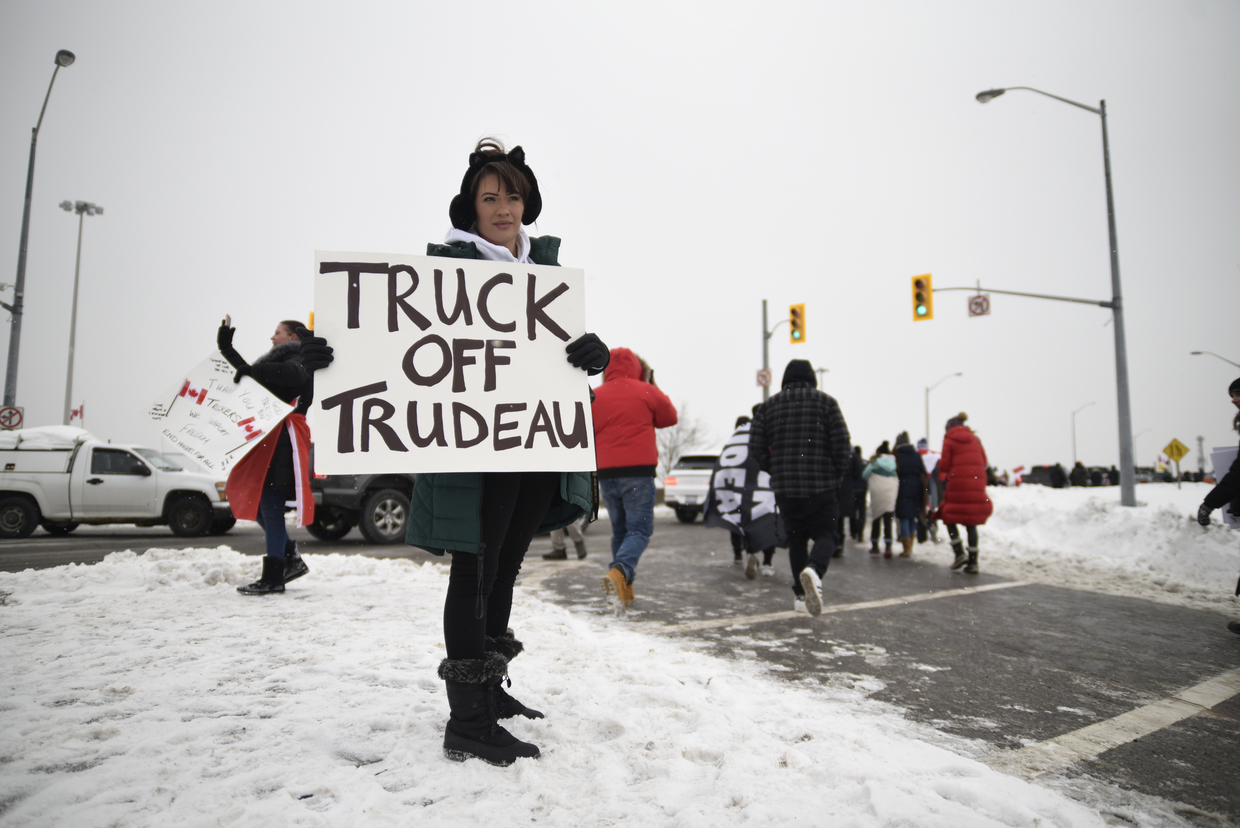
However, the truckers’ demonstration has also prompted criticism from those who consider its participants to be “far-right” and spreading “disinformation.” Ottawa police have told the media they were preparing for counter-protests and that they have received a “direct threat” aimed at officers from an unspecified individual. Officials have also been warning some “extremist” groups might try to capitalize on the mass protest, with the New Democratic Party leader going as far as saying that some “elements” were “attempting to turn the convoy into a Canadian version of the terrorist attacks on the US Capitol.”
4. How long will the truckers’ protest last?
According to a running clock on the group’s official webpage, the “Countdown to Freedom” ends in less than a day, as of the time of writing. The most recent updates about their itinerary for Sunday show a prayer service for 11am (Eastern Standard Time) and a press conference at 1pm, where additional details may be announced. The protesters had planned to encamp in Ottawa for at least the weekend, but police sources have suggested that the rally could potentially continue into the next week.
5. Has the ‘Freedom Convoy’ protest in Ottawa been peaceful?
The city’s police force has reportedly been augmented by officers from other parts of the province as well as members of the national security and intelligence community to stop potential unrest. Ottawa Police Chief Peter Sloly had described the situation on Friday as “unique, fluid, risky, and significant” and warned of threats from “lone wolf” actors who may have infiltrated the crowds. He also warned of “social media actors” who are “inciting hate, violence, and in some cases, criminality to take place.”
However, no violence, arrests or injuries have been reported by authorities so far and the convoy organizers have said the “movement is a peaceful protest” and does “not condone any acts of violence.” In a statement on Friday, the Freedom Convoy organizers had urged participants to “treat all police officers with respect” and “not make any type of threat."
6. Where is Justin Trudeau in all of this?
Prime Minister Trudeau and his family were apparently shifted to an “undisclosed location” in Ottawa on Saturday due to security concerns. Several trucks in the convoy displayed slogans and signs such as “F**k Trudeau,” with protesters apparently using as a rallying cry his earlier dismissal of the movement as the voices of a “fringe minority” that harbored “unacceptable views.” Some have reportedly called for Trudeau to be charged with treason or beaten up. In one of his last interviews prior to being moved, Trudeau expressed concern on Friday about the potential for violence – claiming the movement has “morphed into something a lot larger” but was still “a very small, very angry group... who are really trying to lash out.”
7. What are people outside Canada saying about the truckers’ protest?
The unusual scale and scope of the protest has captured public attention outside the country. Former US President Donald Trump praised the convoy participants at a rally in Texas on Saturday, noting that they were “doing more to defend American freedom than our own leaders by far.” Other prominent individuals that have spoken in support include Tesla CEO Elon Musk, podcaster Joe Rogan and comedian Russell Brand. Reactions from some liberal pundits and US media has been mostly negative, with some opinions linking the protesting truckers to far-right groups, white supremacist ideologies and Covid misinformation. The Washington Post has published an opinion piece calling on Canada to “confront the toxic ‘Freedom Convoy’ head-on,” in which columnist David Moscrop described the truckers as “a fringe group” and claimed they were “driven by a generalized rage, misplaced anger about supply-chain challenges and antigovernment sentiment.”
